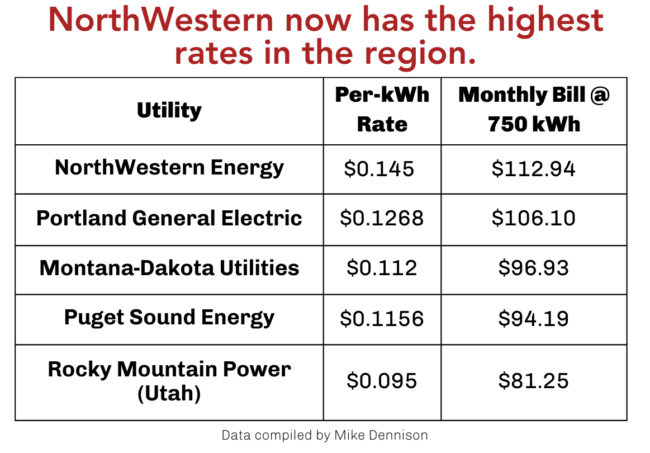By Anne Hedges

Anyone who watched the most recent NorthWestern Energy rate case meetings was left wondering whether the Public Service Commissioners (PSC) had read any of the thousands of pages of documents and expert reports that detailed why NorthWestern was not entitled to its proposed electric rate increase. It was clear the Commissioners hadn’t listened to testimony or comments about the rapidly rising cost of living and the concerns for those who are already facing steep housing and food costs. Instead, the PSC did what NorthWestern asked and saddled hundreds of thousands of Montanans and families with the largest share of the increase in electricity rates.
In normal rate case proceedings, elected PSC Commissioners will discuss the merits of the arguments raised by the parties who participated in the case. The Commissioners will debate whether to increase rates as requested by a monopoly utility or whether to choose a different path that better protects customers. But not this time.
Instead of publicly discussing the positions of the various parties and providing direction to the staff to craft a draft order, the PSC took a new, very troubling path. It made a decision behind closed doors, away from the eyes of the public whom it serves. It never publicly debated the merits of the case. It never publicly provided direction to the staff to craft a proposed order. It never told the public why it couldn’t protect their interests from a monopoly utility that is required to benefit its shareholders regardless of the impact on captive customers. In short, the Commission never told the public why it disagreed with the vast majority of parties in the rate case and instead allowed NorthWestern to increase residential electric bills a whopping 28%. Residential customers are left wondering why they have to shoulder a greater increase in their electric rates than businesses and major industrial customers.
One reason might be that NorthWestern struck a deal with the Montana Consumer Counsel (MCC) and large industrial customers. Like MEIC, the MCC had strongly objected to some very unusual “riders” in the original rate request, which would have increased customer costs even more by allowing the utility to charge hundreds of millions of dollars for NorthWestern’s Laurel gas plant. NorthWestern agreed to eliminate these riders in order to persuade the MCC to strike a deal. The MCC, who represents all customers and not just residences, was under the gun; its budget was still before the Legislature, and it had been publicly targeted by Republican leaders early in the session, narrowly escaping an outright attempt to muzzle it in legislative committees. Days before the April PSC rate hearing, the MCC struck a deal with NorthWestern and some of the largest industrial facilities in the state that would require residential customers to bear the brunt of the rate increase.
At the October hearing, the PSC Commissioners complained that they didn’t have authority to reject the deal and that protecting customers was the sole responsibility of the MCC. Commissioners read prepared statements and didn’t consider the arguments of other parties who were excluded from the deal.
In actuality, the PSC is elected to protect all customers — including residential customers — and balance the interests of average Montanans with the right of the utility to earn fair compensation for the service it provides. What is the point of having a PSC if the monopoly utility always gets whatever it wants, without regard to the harms suffered by Montanans?
The fact that Montanans now have the highest electricity rates in the region means the PSC is failing to do its job. Montana families are the losers in this dangerous new approach to utility “oversight.”
This article was published in the December 2023 issue of Down To Earth.

